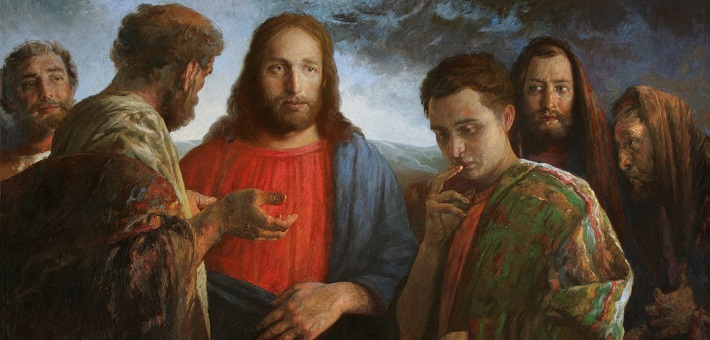Commentary on Mark 10:17-31
We read here one of the most radical teachings we can find in the Gospel. “Radical” is a word that tends to be used frequently in progressive and liberal theological settings, sometimes with a meaning similar to “prophetic.” By its own nature, however, “radical” has a rather restrictive meaning. In some cases, it has come to designate a lack of realistic vision or a counterproductive approach in political venues. It is not uncommon to hear the epithet “radical” used to discredit political opponents for their uncompromising stances. “The radical left” or “the radical right” are expressions meant to smear political, theological, or cultural understandings about political programs. Radical, in such usage, equates to extremism and bias.
The word’s etymology takes us in a different direction. It is a good reminder that although origin does not equate to current usage, we miss something vital if we let contemporary cultural wars swallow original meaning. As it happens, “radical” comes from radix, radicis and refers to the roots of a plant, a problem, the grounding assumptions of an argument. Subsequently, to say that the teaching in this Gospel, as I suggest, is “radical” is to hint at the idea that the narrative tackles a grounding problem, it touches a root problem. Since the passage in question broaches the topic of discipleship, the epithet “radical” refers to what constitutes the essence of Christian belonging and identity.
Ethical claims on the pericope have circled around the nature of the “plus” that Jesus, here characterized as a teacher, implies in his response to the inquisitive character. Does Jesus’ response go beyond what the Law established, or does it instead add a new rule that grounds the essence of the Christian life?
From the narrative world of Mark, we know that the closest disciples had left everything behind (10:28) and that “everything” includes house and household, family, and belongings (10:29). Mark is the evangelist who offers a non-descript characterization of the man approaching him. Whereas Luke characterizes him as a ruler, Matthew portrays him as a young man. Except for the fact that this anonymous character reveres Jesus as a teacher, that he seems to be a wealthy and pious observant of the Law, readers can hardly intimate this character’s essential traits.
It is almost as if the Gospel has constructed his anonymity as a template to complexify Jesus’ teachings. Furthermore, the wealthy man serves as a contrasting character that puts to the test what elements integrate ideal discipleship. Anonymity functions as a literary device that invites potential communities of interpreters to think, visualize, and imagine the ultimate Gospel’s demands.
In this essay, I would like to focus on two unexplored dimensions of Christian belonging. The first dimension, which I consider political in nature, relates to the topic of enslavement. The second one, better understood in its ethical consequences, affects the construction of personal identity. Both aspects are interrelated, and the pericope suggests that the political crisis causes the personal one.
It usually goes unnoticed that such a wealthy man (10:22) would likely be the owner of urban and rural properties. We do not know whether such wealth came from an inherited position or trading goods. However, by all first-century wealth standards, it is most likely that he would own slaves to take care of his properties, manage his household, or perform several tasks in his financial enterprises. Jesus’ injunction to sell all of his belongings would consequently include enslaved people. Similarly, Jesus’ request to donate the ensuing earnings to the poor would positively impact the lower ranks of the social order where many slaves resided.
The suggestion that Jesus’ teaching would have led the enquirer to cease to be an enslaver does not imply that Jesus’ teachings and early formulations around it are anti-slavery. On the contrary, if this man were to sell his slaves, they would have been incorporated into another household. Furthermore, the New Testament and particularly the gospels have several passages where enslavement, if not explicitly condoned, is not openly criticized. Jesus’ response suggests, however, that the identity distilled from owning other people and belongings (here put on the same level) is incompatible with following him as a disciple.
The second dimension, ethical in nature, is reflected in how the Gospel depicts the man’s reaction after the teaching. Mark describes the man’s reaction with the word stugnasas usually translated as “shocked,” “surprised,” or “in sorrow” (10:22). Such a translation evokes a feeling, a state of mind, a mood even.
Although the original word does not make it into the range of moral defects that we encounter in the coetaneous Greco-Roman sources, its meaning goes beyond a temporary range of emotions. For instance, when comparing Demosthenes and Cicero, Plutarch refers to the first showing “bitterness and sullenness” (4, 210). In “Lament for Adonis,” Bion refers to King Acheron as “grim and cruel” (510, line 52). Both authors use stugnasas to describe a moral disposition rather than a temporary mood. If we understand the wealthy man’s reaction in terms of morality (virtue) rather than psychology (mood), one could infer that Jesus’ teaching creates a crisis of character. In other words, Jesus’ teaching, rather than creating a temporary emotion, reveals the durable disposition of a man unable to release his belongings (slaves included).


October 10, 2021